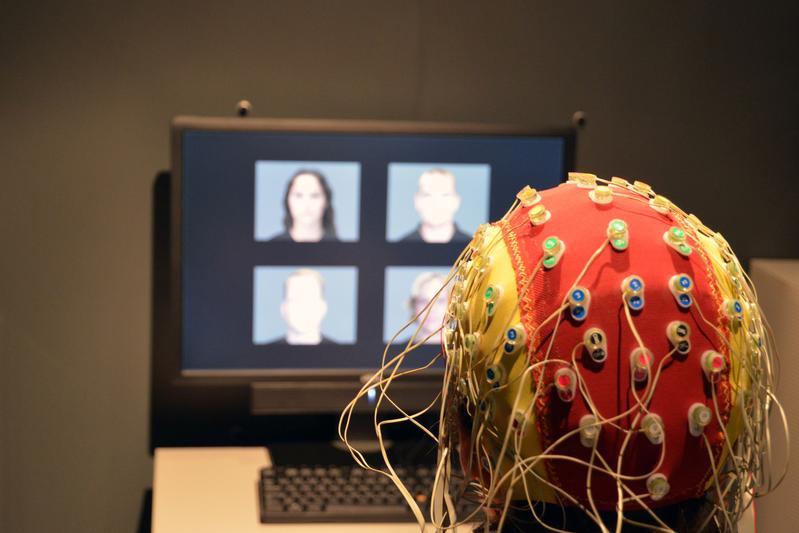

A subject solves a facial recognition task while EEG measurements of electrical activity in his brain are measured.
Credit: Fabio Bergamin / ETH Zurich
Scientists refer to this as the neural efficiency hypothesis, although it ceased being a hypothesis quite some time ago and is now accepted by experts as an undisputed fact, with ample evidence to support it.
While working on her doctoral thesis in Stern's work group, Daniela Nussbaumer also found evidence of this effect for the first time in a group of people possessing above-average intelligence for tasks involving what is referred to as working memory.
“We measured the electrical activity in the brains of university students, enabling us to identify differences in brain activity between people with slightly above-average and considerably above-average IQs,” explained Nussbaumer. Past studies conducted to identify the effect of neural efficiency have generally used groups of people that exhibit extreme variations in intelligence.
Facial memory tested
Psychologists define working intelligence as a person's ability to associate memories with new information as well as to adapt to changing objectives by filtering out information that has become irrelevant. The frontal lobe plays a pivotal role in these processes. In order to test these abilities, the ETH researchers asked 80 student volunteers to solve tasks of varying complexity on a computer.
One task, for example, was to determine whether individual letters or faces were part of a selection of letters or faces that had been shown to the subjects immediately beforehand. An especially difficult task involved identifying letters and faces shown to the subjects during past runs of the test within a time limit.
While the students were completing the tests, the researchers used electroencephalography (EEG) to measure their brain activity. For the results analysis, the researchers had the subjects take a conventional IQ test and then split them into two groups: one with slightly above-average IQs and another with well above-average IQs.
Neural efficiency for moderately difficult tasks
The researchers found no differences in brain activity in either group of subjects when they performed very easy or very difficult tasks. They did, however, see clear differences in the case of moderately difficult tasks. Stern attributes this to the fact that none of the subjects had any trouble whatsoever with the simple tasks and that the difficult tasks were cognitively demanding even for the highly intelligent subjects. In contrast, all subjects succeeded in solving the moderately difficult tasks, but the highly intelligent subjects required fewer resources to do so.
Stern uses the analogy of a more and less efficient car: “When both cars are travelling slowly, neither car consumes very much fuel. If the efficient car travels at maximum speed, it also consumes a lot of fuel. At moderate speeds, however, the differences in fuel consumption become significant.”
Intelligence is not a muscle
So is it possible to use EEG measurements to draw any direct conclusions about intelligence? Stern qualifies the findings: “If you want to learn something about intelligence, you have to perform a conventional IQ test, because these tests still provide the most reliable results,” she says. EEG and other brain activity readings are not precise enough to assess the intelligence of an individual. Still, using these methods may be an interesting way to study how different levels of intelligence are manifested in the brain.
The ETH researchers' intelligence study also suggests that it is impossible to “exercise” working memory. This has been a controversial issue among scientists in recent years because of contradictory findings in different studies. If subjects practise a certain task for a prolonged period, they improve with time. As Stern and her peers have now shown in their study, people who have practised certain tasks do not have any advantage over their unpractised counterparts when confronted with new, yet similar tasks.
###
Literature reference
Nussbaumer D, Grabner RH, Stern E: Neural efficiency in working memory tasks: The impact of task demand. Intelligence 2015. 50: 196-208, doi: 10.1016/j.intell.2015.04.004 [http://dx.












